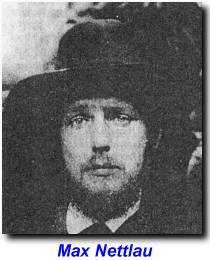 Perhaps the most important sources of information on anarchist and anti-authoritarian history are the works of Max Nettlau (1 865-1944). In particular his Die Geschichte Des Anarchismus (the History of Anarchism). Chapter ten deals with "Anarchist propaganda and Industrial Unionism in Australia and New Zealand". Unfortunately only one page deals with Aotearoa, and this finishes in 1913. Nettlau was an Austrian anarchist active in the movement for over sixty years. He contributed to nearly all the major anarchist publications of his day, and wrote many biographies of leading anarchists, including Bakunin and Malatesta. He accumulated a huge collection of anarchist material which is gathered together in the International Institute of Social History in Amsterdam. This is the translation of the page on New Zealand.
Perhaps the most important sources of information on anarchist and anti-authoritarian history are the works of Max Nettlau (1 865-1944). In particular his Die Geschichte Des Anarchismus (the History of Anarchism). Chapter ten deals with "Anarchist propaganda and Industrial Unionism in Australia and New Zealand". Unfortunately only one page deals with Aotearoa, and this finishes in 1913. Nettlau was an Austrian anarchist active in the movement for over sixty years. He contributed to nearly all the major anarchist publications of his day, and wrote many biographies of leading anarchists, including Bakunin and Malatesta. He accumulated a huge collection of anarchist material which is gathered together in the International Institute of Social History in Amsterdam. This is the translation of the page on New Zealand.
This real New Zealand is not to be found in apologetic writings (e.g. the Fabian Tract, no 74, "The State and its Functions in New Zealand, " London Dec 1896, but at least in some of the local worker's papers, some of which have reached Freedom since 1911. The Maoriland Worker, official organ of the N.Z. Federation of Labour stood for Industrial Unionism, as did the Social Democrat. Here may belong "Unionism Old and New", the substance of a lecture delivered before the Auckland Trades and Labour Council October 1910: by H. Scott Bennett printed by the Auckland Socialist Party 1910. "Labours Leg Iron" or "Liberal and Labour Party Arbitration Acts in New South Wales" with a brief reference to the N.Z. Arbitration Act by H.E.Holland, Maoriland Worker pamphlet 1912. This concerns the strike at Broken Hill. To combat militarism appeared, "Gaoling the Boys. Will the people of N.Z. stand for it ?". Issued by the Anti-Conscription League Wellington. In Christchurch appeared the "Anti-Militarist", Sept 1911. I only know of this issue. In the last mentioned city the only Australian Ferrer publication of which I know was published.. "Ferrer And His Enemies" by W. W. Collins, published by the N.Z. Rationalist Association 1911. Since that time no news of recognizably libertarian stirrings has reached me.'
Notes. (1) In January 1913 Freedom (London) was able to be obtained at four places: Wellington, Christchurch, Invercargill and Auckland. P. Josephs the seller in Wellington who, for example, reviewed English anarchist literature in The Maoriland Worker, was the only anarchist there in 1911 and could only occasionally distribute Freedom and brochures from London. S Trunk, the militant German anarchist, previously in London, migrated to New Zealand Where his brother in-law Lutjohann lived, and nothing more was heard from him. This was a little before or after 1900. Towards the end of 1898 Paul Robin travelled to New Zealand but came back to Paris after several months. Michael Flurscheim visited New Zealand in 1904 in the course of his journey to investigate the possibilities of establishing a colony in the spirit of his land reform ideas. In those years appeared "A Federated Home, Wainoni" from the Canterbury Times 5 April 1899.
(2)Tom Mann, "Socialism. Does New Zealand stand in need of it?" Wellington 1901, mentioned in his "Memoirs" is unknown to me. The date should read 1902, because he first stepped foot in that country in January of that year.